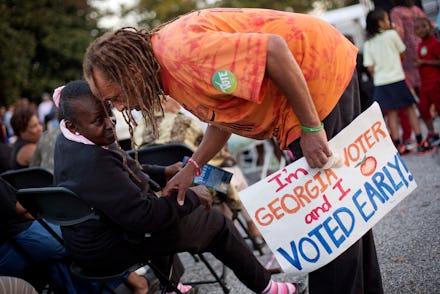A Modern Jim Crow Law Exists, and It Could Affect 7 Million People

Jim Crow laws are back.
At least according to civil rights giant Rev. Joseph Lowery, as reported by Al Jazeera America, which released a new investigation Wednesday into a wave of injustices behind a huge program meant to fight voter fraud. Instead, that's effectively ended up targeting minority voters whose only "crime" is sharing a first and last name.
It's called the Interstate Crosscheck program, a list of nearly 7 million names examined to find people who are theoretically voting twice across states. The list is used in 27 states, mostly by Republican officials, to identify fraud and potentially take voters off the rolls.
The problem, as Al Jazeera found in Crosscheck lists for Georgia, Virginia and Washington, is that the list often misses many basic details that would clear up cases of "fraud," while including a disproportionate number of minorities.
The problem itself: Among the nearly 7 million suspected double voters on the list, there are some very clear details that would seem immediately to excuse voters. Middle names often aren't taken into account, and neither are suffixes (like Jr.) or birthdates.
This means that people with common last names — like Jackson, Garcia, Patel and Kim — are much more likely to appear on the list, which overrepresents minority voters. One in 7 black residents of the 27 states using Crosscheck appear on the list, according to Al Jazeera, as do 1 in 8 Asian and Hispanic voters. One in 11 white voters appears.
When compared to the populations of these states, black voters are 45% overrepresented on the potential fraud list, while Asian voters are 31% overrepresented and Hispanic voters are 24% overrepresented. White voters are 8% underrepresented. What this means is that minority voters with "nonwhite-sounding names" are much more likely to be targeted for possible voter fraud and are therefore more likely to be unlawfully disenfranchised.
On top of this, minority voters are much more likely to vote for Democrats, meaning if even a small percentage of voters on the Crosscheck list are taken off the voter rolls, it could have a huge impact on this and future elections.
The background: The Crosscheck project can largely be traced to Kansas secretary of state Kris Kobach, whose zealous pursuit of voter fraud has drawn plenty of criticism, both in Kansas and on a national level.
So far, there have already been stories of like Kevin Antonio Hayes of Durham, North Carolina, being listed as a potential fraudulent voter because someone named Kevin Thomas Hayes voted in Alexandria, Virginia. Al Jazeera actually has a tool to see if your name is on the list. You could be flagged if anyone shares your first and last name, even if they vote in a different state, have a different middle name and are a different age.
It's worth remembering that a study from earlier this year found 31 credible cases of voter fraud in a sample of one billion votes. Yet between the Crosscheck list and the 20 states that require photo identification to vote, it's often minority voters who end up paying the price.